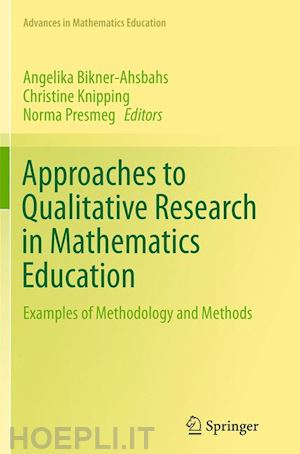
Questo prodotto usufruisce delle SPEDIZIONI GRATIS
selezionando l'opzione Corriere Veloce in fase di ordine.
Pagabile anche con Carta della cultura giovani e del merito, 18App Bonus Cultura e Carta del Docente
Part 1: Grounded theory methodology. Chapter 1: Anne R. Teppo. Grounded Theory Methods. Chapter 2: Maike Vollstedt. To see the wood for the trees: The development of theory from empirical interview data using grounded theory.- Part 2: Approaches to reconstructing argumentation. Chapter 3: Götz Krummheuer. Methods for reconstructing processes of argumentation and Chaptericipation in primary mathematics classroom interaction. Chapter 4: Christine Knipping and David Reid. Reconstructing argumentation structures: A perspective on proving processes in secondary mathematics classroom interactions.- Part 3: Ideal type construction. Chapter 5: Angelika Bikner-Ahsbahs. Empirically grounded building of ideal types. A methodical principle of constructing theory in the interpretive research in mathematics education. Chapter 6: Angelika Bikner-Ahsbahs. How ideal type construction can be achieved: An example.- Part 4: Semiotic research. Chapter 7: Luis Radford and Cristina Sabena. The question of method in a Vygotskian semiotic approach.- Part 5: A theory on abstraction and its methodology. Chapter 8: Tommy Dreyfus, Rina Hershkowitz and Baruch Schwarz. The nested epistemic actions model for Abstraction in Context: Theory as methodological tool and methodological tool as theory.-
Part 6: Networking of theories. Chapter 9: Ivy Kidron and Angelika Bikner-Ahsbahs. Advancing research by means of the networking of theories. Chapter 10: Angelika Bikner-Ahsbahs and Ivy Kidron. A cross-methodology for the networking of theories: The general epistemic need (GEN) as a new concept at the boundary of two theories.- Part 7: Multi-level-analysis. Chapter 11: Geoffrey B. Saxe, Kenton de Kirby, Marie Le, Yasmin Sitabkhan, Bona Kang. Understanding learning across lessons in classroom communities: A multi-leveled analytic approach.- Part 8: Mixed Methods. Chapter 12: Udo Kelle and Nils Buchholtz. The combination of qualitative and quantitative research methods in mathematics education—A “Mixed Methods” study on the development of the professional knowledge of teachers.- Part 9: Qualitative Content Analysis. Chapter 13: Philipp Mayring. Qualitative Content Analysis: Theoretical background and procedures. Chapter 14: Björn Schwarz. A study on professional competence of future teacher students as an example of a study using Qualitative Content Analysis.- Part 10: Triangulation and cultural studies. Chapter 15: Ida Ah Chee Mok and David J. Clarke. The contemporary importance of triangulation in a post-positivist world: Examples from the Learner’s Perspective Study.- Part 11: Design research as aresearch methodology. Chapter 16: Arthur Bakker and Dolly van Eerde. An introduction to design-based research with an example from statistics education. Chapter 17: Michèle Artigue. Perspectives on design research: The case of didactical engineering. Chapter 18: Erin Henrick, Paul Cobb and Kara Jackson. Educational design research to support system-wide instructional improvement. Part 12: Looking back. Chapter 19: Angelika Bikner-Ahsbahs, Christine Knipping and Norma Presmeg. Appendix.- References.- Index of keywords.











Il sito utilizza cookie ed altri strumenti di tracciamento che raccolgono informazioni dal dispositivo dell’utente. Oltre ai cookie tecnici ed analitici aggregati, strettamente necessari per il funzionamento di questo sito web, previo consenso dell’utente possono essere installati cookie di profilazione e marketing e cookie dei social media. Cliccando su “Accetto tutti i cookie” saranno attivate tutte le categorie di cookie. Per accettare solo deterninate categorie di cookie, cliccare invece su “Impostazioni cookie”. Chiudendo il banner o continuando a navigare saranno installati solo cookie tecnici. Per maggiori dettagli, consultare la Cookie Policy.